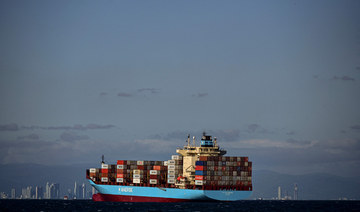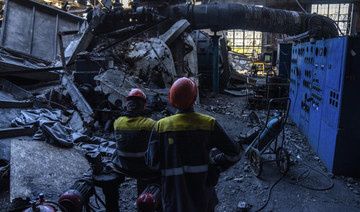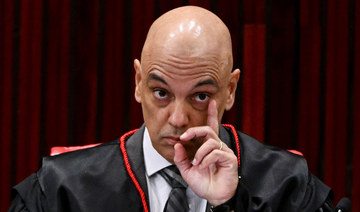YANGON: Myanmar's military leaders came under renewed pressure Tuesday as the world's wealthiest nations condemned the junta for responding to anti-coup demonstrators "with violence", a rebuke coming on the heels of tightened sanctions from Washington and Brussels.
Authorities have gradually ratcheted up their use of force against a massive and largely peaceful civil disobedience campaign demanding the return of ousted leader Aung San Suu Kyi.
Three anti-coup protesters have been killed in demonstrations so far, while a man patrolling his Yangon neighbourhood against night arrests was also shot dead on the weekend.
"Use of live ammunition against unarmed people is unacceptable," the foreign ministers of the G7 group of rich democracies -- comprising Canada, France, Germany, Italy, Japan, Britain, the United States together with the EU -- said in a statement Tuesday.
"Anyone responding to peaceful protests with violence must be held to account," they said, calling for Myanmar security forces to "exercise utmost restraint and respect human rights and international law".
The sharp condemnation comes after the overnight blacklisting of another two members of the regime by the United States -- air force chief Maung Maung Kyaw and fellow junta member Moe Myint Tun -- after announcing targeted sanctions against other top generals earlier this month.
"We will not hesitate to take further action against those who perpetrate violence and suppress the will of the people," Secretary of State Antony Blinken said.
Hours before, the European Union had also approved sanctions targeting Myanmar's military and their economic interests, with EU foreign policy chief Josep Borrell saying that financial support to the government reform programmes is "withheld".
Protesters continued staging rallies across Myanmar, though commercial hub Yangon saw much smaller numbers massing at key junctions on Tuesday.
In the northern Kachin city of Myitkyina -- which has seen bursts of violence from authorities -- protesters rode their motorbikes across town waving the Myanmar flag and flashing a three-finger salute, a symbol of resistance.
Mandalay saw a more sombre crowd at the funeral of Thet Naing Win, a 37-year-old man shot and killed Saturday when security forces opened fire into a crowd of anti-coup protesters.
"I beg for all to help see that my husband's case is ruled with justice," said his widow Thidar Hnin, adding that she wants to see "the dictator dethroned".
"This country is owned by the citizens," she told AFP.
G7 countries ‘firmly condemn’ Myanmar military attacks on protesters
https://arab.news/p46bj
G7 countries ‘firmly condemn’ Myanmar military attacks on protesters
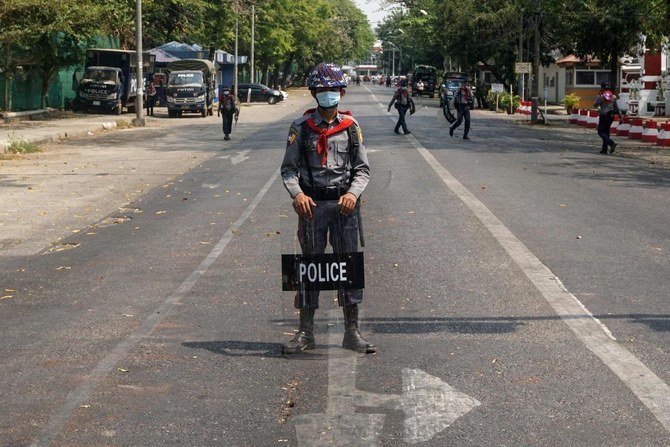
Panamanians vote in an election dominated by a former president who was barred from running

- The presidential race remained in uncertain waters until Friday morning, when Panama’s Supreme Court ruled that leading presidential contender José Raúl Mulino was permitted to run
PANAMA CITY: Panamanians are voting Sunday in an election that has been consumed by unfolding drama surrounding the country’s former president, even though he is not on the ballot.
As the sweltering sun beat down over the normally sleepy Central American nation, voters lined up outside polling stations. Eager for change after months of political turmoil and protests, Panamanians are weighing promises of economic prosperity and migratory crackdowns against a corruption scandal.
“Panama’s election will be one of the most complex in its modern history. The vote is marked by increased political fragmentation and social discontent under outgoing President Laurentino Cortizo,” said Arantza Alonso, senior analyst for the Americas at the risk consulting firm Verisk Maplecroft, before the polls opened.

The presidential race remained in uncertain waters until Friday morning, when Panama’s Supreme Court ruled that leading presidential contender José Raúl Mulino was permitted to run. It said he was eligible despite allegations that his candidacy wasn’t legitimate because he wasn’t elected in a primary.
Mulino joined the race late, replacing former President Ricardo Martinelli as the candidate for the Achieving Goals party. The fiery Martinelli was barred from running in March after he was sentenced to more than 10 years in prison for money laundering.
Martinelli, a business tycoon who was president of Panama from 2009 to 2014, has dominated much of the race. He campaigned for his former running mate from inside the walls of the Nicaraguan Embassy, where he took refuge in February after receiving political asylum. On Sunday morning, Mulino strolled into the Nicaraguan embassy trailed by photographers and wrapped Martinelli in a big hug, saying, “Brother, we’re going to win!”
While lacking Martinelli’s spunk, Mulino has coasted on his connection to the ex-president. He is rarely seen without his blue “Martinelli Mulino 2024” cap and promised to help Martinelli if elected, a pledge welcomed by the ex-president’s supporters.
Panamanians are largely fatigued by the endemic graft that plagues the country. Nonetheless, many are willing to overlook Martinelli’s prison sentence, a 2017 arrest in Florida and other corruption scandals in favor of the humming economy seen during his presidency.
Among them was Juan José Tinoco, voting from his working-class area of small, concrete houses surrounded by extravagant skyscrapers. The 63-year-old bus driver said he planned to vote for Mulino because it was the closest thing he could get to Martinelli, adding that he had earned a decent amount of money during the former president’s time in power.
“We have problems with health services, education, we have garbage in the streets ... and corruption that never goes away,” Tinoco said. “We have money here. This is a country that has lots of wealth, but we need a leader who dedicates himself to the needs of Panama.”
Mulino promised to usher in another wave of economic prosperity, and stop migration through the Darien Gap, the perilous jungle region overlapping Colombia and Panama that was traversed by half a million migrants last year.
While Mulino’s message resonated with many voters, others like 68-year-old Uber driver Emanuel Romero agreed the country needed change but with someone new at the helm.
Romero’s car was painted with banners of Ricardo Lombana, a candidate who has decried corruption and sought to earn the vote of young Panamanians eager for change.
Mulino has led polls with around 35 percent of the vote, while his competitors have lagged behind. Former President Martín Torrijos trailed in second at 15 percent, while former presidential candidates Rómulo Roux and Lombana scooped up 14 percent and 12 percent respectively, according to a March poll by the Panamanian Institute of Civic Studies.
“If we want to see more of the same — corruption and our country falling apart — let’s vote for the same people. I will vote for someone independent, and I trust he’ll do things in a better way that will save the country,” Romero said.
No matter who takes the reins, Panama’s next president faces an uphill battle, on the economy especially. Last year, the Central American nation was roiled for weeks by mass anti-government protests, which came to encapsulate deeper discontent among citizens.
The protests targeted a government contract with a copper mine, which critics said endangered the environment and water at a time when drought has gotten so bad that it has effectively handicapped trade transit through the Panama Canal.
While many celebrated in November when the country’s Supreme Court declared the contract unconstitutional, the mine closure, the recent slowdown of economic growth and slashed Canal transit will put Panama’s new leader in a tight spot.
Anti-war protesters leave USC after police arrive, while Northeastern ceremony proceeds calmly

- Israel has killed more than 34,000 Palestinians, according to Gaza’s Health Ministry
WASHINGTON: Students protesting the war in Gaza abandoned their camp at the University of Southern California early Sunday after being surrounded by police and threatened with arrest, while Northeastern University’s commencement began peacefully at Boston’s Fenway Park.
Developments in both places were being watched closely following scores of arrests last month — 94 people at USC in Los Angeles and about 100 at Northeastern in Boston.
Dozens of Los Angeles Police Department officers arrived about 4 a.m. at USC to assist campus safety officers. The university had warned of arrests on social media and in person. Video showed some protesters packing up and leaving, while officers formed lines to push others away from the camp as it emptied out. The university said there were no reports of any arrests.
USC President Carol Folt said it was time to draw a line because “the occupation was spiraling in a dangerous direction” with areas of campus blocked and people being harassed.
“The operation was peaceful,” Folt wrote in an update. “Campus is opening, students are returning to prepare for finals, and commencement set-up is in full swing.”
USC earlier canceled its main graduation ceremony while allowing other commencement activities to continue.
At the Northeastern commencement Sunday, some students waved small Palestinian and Israeli flags, but were outnumbered by those waving the flags of India and the US, among others. Undergraduate student speaker Rebecca Bamidele drew brief cheers when she called for peace in Gaza.
The Associated Press has tallied about 2,500 people arrested at about 50 campuses since April 18, based on its reporting and statements from universities and law enforcement.
Arrests continued apace over the weekend. At the University of Virginia, there were 25 arrests Saturday for trespassing after police clashed with protesters who refused to remove tents. At the Art Institute of Chicago campus, police cleared a pro-Palestinian encampment hours after it was set up Saturday and arrested 68 people, saying they would be charged with criminal trespass.
ARRESTS IN VIRGINIA
In Charlottesville, Virginia, student demonstrators began their protest on a lawn outside the school chapel Tuesday. Video on Saturday showed police in riot gear and holding shields lined up on campus, while protesters chanted “Free Palestine.”
As police moved in, students were pushed to the ground, pulled by their arms and sprayed with a chemical irritant, Laura Goldblatt, an assistant professor who has been helping the demonstrators, told The Washington Post. The university said protesters were told that tents were banned under school policy and were asked to remove them.
Virginia Attorney General Jason Miyares told Fox News on Sunday the police response was justified because students had been warned repeatedly to leave, were violating the school’s conduct code, and that outsiders who were not students provided protesters with supplies like wooden barriers.
“We’ve seen folks that are not students show up in riot gear with bull horns to direct the protesters on how to flank our officers,” Miyares said.
He said some had put bear spray into water bottles and thrown them at officers.
It was the latest clash in weeks of protests and tension at US colleges and universities.
Tent encampments of protesters urging universities to stop doing business with Israel or companies they say support the war in Gaza have spread in a student movement unlike any other this century. Some schools reached agreements with protesters to end the demonstrations and reduce the possibility of disrupting final exams and commencements.
DEMONSTRATIONS AMID COMMENCEMENT
The University of Michigan was among the schools bracing for protests during commencement this weekend, as were Indiana University, Ohio State University and Northeastern. More ceremonies are planned in the coming weeks.
In Ann Arbor, there was a protest at the beginning of the event at Michigan Stadium. About 75 people, many wearing traditional Arabic kaffiyehs along with their graduation caps, marched up the main aisle toward the stage.
They chanted “Regents, regents, you can’t hide! You are funding genocide!” while holding signs, including one that read: “No universities left in Gaza.”
Overhead, planes pulled banners with competing messages. “Divest from Israel now! Free Palestine!” and “We stand with Israel. Jewish lives matter.”
Officials said no one was arrested, and the protest didn’t seriously interrupt the nearly two-hour event, attended by tens of thousands of people, some of them waving Israeli flags.
OTHER PROTESTS CONTINUE
At Indiana University, protesters urged supporters to wear their kaffiyehs and walk out during remarks by school President Pamela Whitten on Saturday evening. The Bloomington campus designated a protest zone outside Memorial Stadium, where the ceremony was held.
At Princeton University in New Jersey, 18 students began a hunger strike to try to push the university to divest from companies tied to Israel. Students at other colleges, including Brown and Yale, launched similar hunger strikes this year before the more recent wave of demonstrations.
The protests stem from the conflict that started Oct. 7 when Hamas militants attacked southern Israel, killing about 1,200 people, mostly civilians, and taking roughly 250 hostages. Vowing to destroy Hamas, Israel launched an offensive in Gaza that has killed more than 34,500 Palestinians, about two-thirds of them women and children, according to the Health Ministry in the Hamas-ruled territory. Israeli strikes have devastated the enclave and displaced most of its inhabitants.
China’s Xi in France for Macron talks on Ukraine
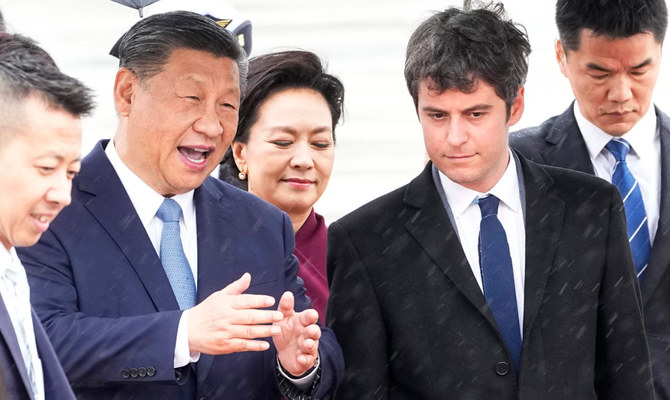
- Tuesday will see Macron take Xi to the Pyrenees mountains to an area he used to visit as a boy for a day of less public talks
PARIS: Chinese President Xi Jinping arrived in France Sunday on a state visit hosted by Emmanuel Macron where the French leader will seek to warn his counterpart against backing Russia in the conflict over Ukraine.
Xi’s arrival for the visit marking 60 years of diplomatic relations between France and China heralded the start of his first trip to Europe since 2019, which will also see him visit Serbia and Hungary.
But Xi’s choice of France as the sole major European power to visit indicates the relative warmth in Sino-French relations since Macron made his own state visit to China in April 2023 and acknowledges the French leader’s stature as an EU powerbroker.
The leader of the one-party Communist state of more than 1.4 billion people, accompanied by his wife Peng Liyuan, was welcomed under umbrellas at a drizzly Paris Orly airport by Prime Minister Gabriel Attal.
Xi is to hold a day of talks in Paris on Monday — also including EU Commission chief Ursula von der Leyen — followed by a state banquet hosted by Macron at the Elysee.
Tuesday will see Macron take Xi to the Pyrenees mountains to an area he used to visit as a boy for a day of less public talks.
In an op-ed for Le Figaro daily, Xi said that he wanted to work with the international community to find ways to solve the conflict sparked by Russia’s invasion of Ukraine, while emphasising that China was “neither a party nor a participant” in the conflict.
“We hope that peace and stability will return quickly to Europe and intend to work with France and the entire international community to find good paths to resolve the crisis,” he wrote.
A key priority of Macron will be to warn Xi of the danger of backing Russia, with Western officials concerned Moscow is already using Chinese machine tools in arms production.
Beijing’s ties with Moscow have, if anything, warmed after the invasion and the West wants China above all not to supply weapons to Russia and risk tipping the balance in the conflict.
“It is in our interest to get China to weigh in on the stability of the international order,” said Macron in an interview with The Economist published on Thursday.
Macron also said in the interview that Europe must defend its “strategic interests” in its economic relations with China, accusing Beijing of not respecting the rules on international trade.
But he acknowledged in an interview with the La Tribune Dimanche newspaper that Europeans are “not unanimous” on the strategy to adopt as “certain actors still see China essentially as a market of opportunities” while it “exports massively” to Europe.
The French president had gladdened Chinese state media and troubled some EU allies after his 2023 visit by declaring that Europe should not be drawn into a “bloc versus bloc” standoff between China and the United States, particularly over democratic, self-ruled Taiwan.
China views the island as part of its territory and has vowed to take it one day, by force if necessary.
Rights groups are urging Macron to bring up human rights in the talks, accusing China of failing to respect the rights of the Uyghur Muslim minority and of keeping dozens of journalists behind bars.
“President Macron should make it clear to Xi Jinping that Beijing’s crimes against humanity come with consequences for China’s relations with France,” said Maya Wang, acting China director at Human Rights Watch.
The group said human rights in China had “severely deteriorated” under Xi’s rule.
A crowd of protesters on Sunday unfurled a Tibetan flag at a demonstration in Paris, accusing Xi of being a “dictator” and wanting to erase local culture in the Tibet region, an AFP reporter said. Paris police put the number of protesters at two thousand.
However analysts are skeptical that Macron will be able to exercise much sway over the Chinese leader, even with the lavish red carpet welcome and a trip to the bracing mountain airs of the Col du Tourmalet over 2,000 meters (6,560 feet) above sea level on Tuesday.
The other two countries chosen by Xi for his tour, Serbia and Hungary, are seen as among the most sympathetic to Moscow in Europe.
“The two core messages from Macron will be on Chinese support to Russia’s military capabilities and Chinese market-distorting practices,” said Janka Oertel, director of the Asia program at the European Council on Foreign Relations.
“However, both messages are unlikely to have a significant impact on Chinese behavior: Xi is not on a mission to repair ties, because from his point of view all is well.”
Niger receives new Russian advisers, equipment
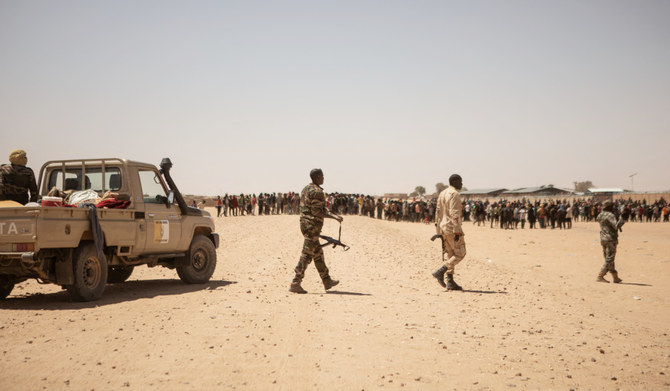
- US Defense Secretary Lloyd Austin indicated on Thursday that Russian troops were now installed at a Nigerien air base near the Niamey airport that also houses US troops
NIAMEY: New Russian military advisers and military equipment have arrived in Niger, according to state television in the African country that wants US forces to leave.
A first set of about 100 Russian advisers arrived in Niger on April 10, along with air defense systems.
Two military transporters arrived on Saturday, according to Tele Sahel that said Russia has now sent three cargo planes of military material and instructors in the past month.
The Africa Corps, seen as the successors of the Wagner paramilitary group in Africa, confirmed the instructors’ arrival in a posting on the group’s Telegram account.
FASTFACT
US Defense Secretary Lloyd Austin indicated that Russian troops were now installed at an air base near the Niamey airport that also houses US troops.
On Saturday, it said more trainers, equipment, and food products had arrived.
US Defense Secretary Lloyd Austin indicated on Thursday that Russian troops were now installed at a Nigerien air base near the Niamey airport that also houses US troops.
Niger’s military regime, which took power in a July 2023 coup, expelled French troops based in the country and then denounced a military cooperation agreement with the US.
It said this had been “unilaterally imposed” by Washington.
Washington agreed in April to withdraw roughly 1,000 soldiers from the country.
Negotiations are underway between the United States and Niger about the withdrawal.
US forces have a key drone base near Agadez, built at a cost of about $100 million.
Niger’s military leaders have moved closer to Russia, as have Mali and Burkina Faso, which also have military coup leaders and are fighting rebel groups affiliated with Al-Qaeda and Daesh.
In April, Idrissa Soumana Maiga, head of the private L’Enqueteur newspaper, was imprisoned after an article mentioned the “presumed” installation of Russian listening devices in official buildings.
Race against time to rescue Brazil flood victims after dozens killed

- The rainfall eased Saturday night but was expected to continue for the next 24-36 hours, with authorities warning of landslides
PORTO ALEGRE, Brazil: Authorities were racing against time on Sunday to rescue people from raging floods and mudslides that have killed more than 50 and forced nearly 70,000 to flee their homes in southern Brazil.
Viewed from the air, Porto Alegre, the capital of Rio Grande do Sul state, is completely flooded, with streets waterlogged and the roofs of some houses barely visible.
The Guaiba River, which flows through the city of 1.4 million people, reached a record high level of 5.09 meters, according to the local municipality, well above the historic peak of 4.76 meters that had stood as a record since devastating 1941 floods.
The water was still advancing into economically important Porto Alegre and around a hundred other localities, with increasingly dramatic consequences.
FASTFACT
The Guaiba River, which flows through the city of 1.4 million people, reached a record high level of 5.09 meters, according to the local municipality, well above the historic peak of 4.76 meters that had stood as a record since devastating 1941 floods.
In addition to some 70,000 residents forced from their homes, Brazil’s civil defense agency also said more than a million people lacked access to potable water amid the flooding, describing the damage as incalculable.
The agency put the death toll at 55, although that did not include two people killed in an explosion at a flooded gas station in Porto Alegre that was witnessed by an AFP journalist.
At least 74 people are also missing, it said.
Rosana Custodio, a 37-year-old nurse, fled her flooded Porto Alegre home with her husband and three children.
“During the night on Thursday the waters began to rise very quickly,” she told AFP via a WhatsApp message.
“In a hurry, we went out to look for a safer place. But we couldn’t walk … My husband put our two little ones in a kayak and rowed with a bamboo. My son and I swam to the end of the street,” she said.
Her family was safe but “we’ve lost everything we had.”
The rainfall eased Saturday night but was expected to continue for the next 24-36 hours, with authorities warning of landslides.
Authorities scrambled to evacuate swamped neighborhoods as rescue workers used four-wheel-drive vehicles — and even jet skis — to maneuver through waist-deep water in search of the stranded.



